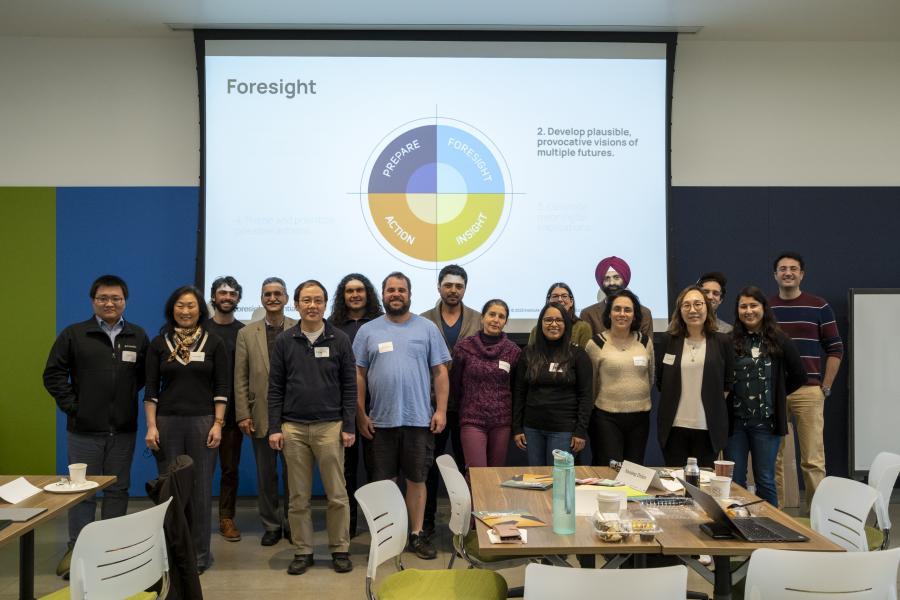Reimagine Faculty
By aligning faculty work, evaluation, and rewards, we allow faculty greater career autonomy, create incentives for interdisciplinary collaboration, and create opportunities to solve grand societal challenges.
Expand Faculty Lines
Creating new types of faculty categories that bolster application and innovation in our field will enhance student education and attract faculty with unique expertise to strengthen the COE’s mission. Expanding faculty lines could also help remedy the COE’s low tenure density compared to the prior decade.
Faculty of Practice exist at some universities, and are typically distinguished professionals with a decade or more of experience in the field. They oversee courses and programs that capitalize on their industry knowledge and connections. Research Faculty also exist at some universities, and are typically research specialists assigned little to no teaching. The new faculty categories would complement the core contributions of the tenure line and lecturer faculty.
Recommended Actions:
Establish a Faculty of Practice category to allow students to learn state-of-the-art industry practice from distinguished professionals.
Establish a Research Faculty category to increase opportunities for student research and faculty collaboration to tackle grand challenges faced by society.
Align Faculty Work, Evaluation, and Rewards
The Retention, Tenure, and Promotion (RTP) policies in the COE are in need of alignment to Beach 2030 and our strategic vision. They should reward interdisciplinary collaborations and work on grand challenges.
They should allow for differential emphasis on teaching, research, and service to leverage individual faculty strengths. They should increase transparency on review criteria and expectations for all levels of review. The COE RTP Policy Task Force has initiated this important project and we will build upon their good work.
Recommended Actions:
Revise college and department RTP policies to provide common guidelines throughout COE and rewards for faculty achievements and interdisciplinary collaborations.
Reimagine Department and College Structures
Traditional college organizations form departments grouped by disciplines and majors. While this organization is logical and efficient, it can be criticized for being territorial and siloed. As new fields emerge and society’s grand challenges become increasingly multidisciplinary, department and college structures need to cultivate and stimulate the interdisciplinarity that will allow us to evolve and remain current.
Recommended Actions:
Identify multidisciplinary faculty cluster areas for future hiring.
Establish policy on joint appointments that builds upon prior experience and best practices.
Move towards a shared, interdisciplinary research laboratory model to foster collaboration, mentorship, and shared resources, and to leverage the square footage available to the college.
Progress:
Progress on Shared Interdisciplinary Labs A feasibility study for a major renovation while we wait on the campus Academic Buildings Priority List was undertaken in Fall 2023. The feasibility study's goals were to identify spaces and the interdisciplinary facilities of most urgent need for the college, with consideration for the long-term plan for a new building. The resulting renovation project is dubbed the Beach Launch Pad – so named for the aerospace work it will enable, but also for the increased project-based learning opportunities that will launch our students into good careers. Plans to renovate the ET wing and the courtyard between EN3 and EN4 to create shared interdisciplinary research and project space were presented in a COE Town Hall meeting in February 2024. The detailed design is underway with an architectural firm, LPA, and is anticipated to take 12-18 months.
Faculty Cluster Hire in AI/Robotics Recent tenure track hires in this area include: Dr. Xin Qin (CECS, autonomous systems), Dr. Cody Karcher (MAE, AI and aircraft design), Dr. Neda KaramiMohammadi (MAE, unmanned robots), Dr. Shams Tanvir (CECEM, AI and transportation), and Dr. Tairan Liu (MAE, multi-agent robots).
RTP Policies The university RTP policy was revised and approved in Spring 2024. In response, the colleges and departments will be revising their policies in 2024-2025. In addition to reflecting the new university policy, the new college and department guidelines should provide more transparency in the expectations for reappointment, tenure, and promotion, as well as reward interdisciplinary collaborations and work supporting Grand Challenges as stated in the COE Strategic Action Plan.
Updated: Sep. 9, 2024
Faculty of Practice Dr. Marwan Youssef has been appointed as the Beavers Faculty of Practice in Heavy Civil Construction. Dr. Youssef has decades of experience with the City of Westminster, where he oversaw infrastructure and construction projects as the city manager. Dean Rhee is one of the team leads for the CSULB Beach 2030 Reimagine Faculty Task Force. Quite a few COE faculty are in the working group for the task force (Antonella Sciortino, Shadi Saadeh, Elhami Nasr), and they have produced a white paper on the Faculty of Practice position for the campus.
RTP Policy Survey on the RTP policy in the college was spearheaded by Dr. Vesna Terzic and the COE RTP Policy Task Force in 2021. Next steps are to update the RTP policies in the COE and departments to increase transparency, align expectations, and promote equity.
Faculty Cluster Areas The COE has received authorization for 5 TT searches in 2023-24: 2 in MAE, 2 in CECS, and 1 in CECEM. The department chairs agreed to give consideration to candidates whose research areas involve robotics and/or AI. If successful, we may be able to build some momentum in this active area.
Shared Interdisciplinary Labs Meetings to discuss a possible shared facility with chemical and biological hoods were initiated on July 20, 2023. COE held a retreat on Futures Thinking, focused on Shared COE Labs of the Future on January 10-11, 2023. From this meeting, a possible shared multiuser facility emerged in materials characterization and microfluidics. A feasibility study for a new COE building was undertaken in AY 2022-23, in which the department chairs proposed the following shared spaces: an innovation and design center, a heavy civil project space, and a robotics and AI facility.
Updated: Aug. 8, 2023





